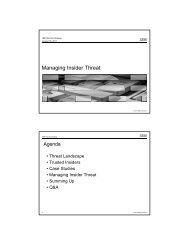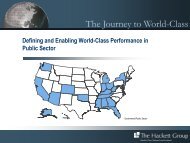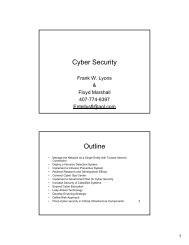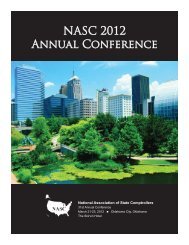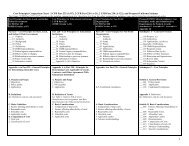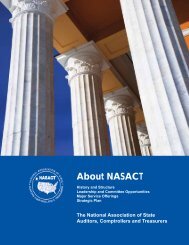Advisory Committee on Tax Exempt and Government Entities (ACT ...
Advisory Committee on Tax Exempt and Government Entities (ACT ...
Advisory Committee on Tax Exempt and Government Entities (ACT ...
Create successful ePaper yourself
Turn your PDF publications into a flip-book with our unique Google optimized e-Paper software.
The Appropriate Role Of The Internal Revenue Service With Respect To <strong>Tax</strong>-<strong>Exempt</strong> Organizati<strong>on</strong> Good Governance IssuesVIII.Why Treasury/IRS Should Proceed With Cauti<strong>on</strong> in Promoting N<strong>on</strong>profitGovernanceThe IRS’s power to interpret its statutory m<strong>and</strong>ate by the issuance of regulati<strong>on</strong> <strong>and</strong>formal guidance is unquesti<strong>on</strong>able. 132 That implementing authority includes the latitudeto promote governance mechanisms to ensure that underlying statutory objectives areachieved. Similarly, the IRS has broad power to inquire about matters of governance inthe c<strong>on</strong>texts of applicati<strong>on</strong>s for recogniti<strong>on</strong> of tax-exempt status, informati<strong>on</strong>al reportingby exempt organizati<strong>on</strong>s, <strong>and</strong> dem<strong>and</strong>s posed in audits <strong>and</strong> other exercises thatm<strong>on</strong>itor the c<strong>on</strong>diti<strong>on</strong>s of exempt status 133 Finally, the IRS’s authority to interpret <strong>and</strong>opine, outside of the vehicles of regulati<strong>on</strong> <strong>and</strong> formal guidance, through educati<strong>on</strong>almaterials <strong>and</strong> public statements, though not specifically articulated in law, rests up<strong>on</strong> anabsence of any prohibiti<strong>on</strong> against use of the “bully pulpit” bey<strong>on</strong>d the statutoryc<strong>on</strong>fidentiality accorded to individual taxpayer informati<strong>on</strong>. 134The greatest possibilities for harm arise at the outer edge of the IRS’s delineatedinterests. Because the formal statutory limits <strong>on</strong> its role in addressing c<strong>on</strong>cerns aboutn<strong>on</strong>profit governance apply to regulatory interacti<strong>on</strong>s with specific tax-exemptorganizati<strong>on</strong>s, the IRS certainly has many opportunities to promote better behavioram<strong>on</strong>g n<strong>on</strong>profit boards. At the same time, that absence of a guiding <strong>and</strong> c<strong>on</strong>strainingframework creates the potential that the IRS may inadvertently undermine theeffectiveness of its own efforts without careful c<strong>on</strong>siderati<strong>on</strong> of the premises <strong>and</strong> likelyimpact of its inquiries <strong>and</strong> pr<strong>on</strong>ouncements. In focusing its broad discreti<strong>on</strong> <strong>on</strong> n<strong>on</strong>profitgovernance, a set of c<strong>on</strong>cerns should guide the IRS in selecting the issues, adoptingpositi<strong>on</strong>s, <strong>and</strong> communicating those views in individual inquiries or public declarati<strong>on</strong>s.• Beware the law of unintended c<strong>on</strong>sequences. When articulated by aregulatory agency with vast authority, every questi<strong>on</strong> has the potential toaffect the behavior of the regulated—even when articulated without intenti<strong>on</strong>albias. While some inquiries may be intended to drive the behavior of n<strong>on</strong>profitboards to adopt certain policies that are sound or implement certain practicesthat are commendable, unintended c<strong>on</strong>sequences arising frommisinterpretati<strong>on</strong> of the meaning or weight of these ideas are more likely thefurther that the IRS moves from the explicit requirements of the tax code. Oneof the potentially disturbing c<strong>on</strong>sequences could be discouraging volunteer132Administrative Procedure Act, 5 U.S.C. § 553.133The authority to inquire, at least in the audit <strong>and</strong> enforcement c<strong>on</strong>text, is broad but not without limits. See, e.g., United States v.Powell, 379 U.S. 48, 56 (1964)(rejecting a probable cause st<strong>and</strong>ard in c<strong>on</strong>necti<strong>on</strong> with the IRS’ dem<strong>and</strong> in an audit for informati<strong>on</strong>relevant to time periods ostensibly bey<strong>on</strong>d the statute of limitati<strong>on</strong>s, but noting “… the resp<strong>on</strong>sibility of agents to exercise prudentjudgment in wielding the extensive powers granted to them by the Internal Revenue Code.”). IRC secti<strong>on</strong> 6033(a) grants authorityto the IRS to m<strong>and</strong>ate the filing of returns to collect informati<strong>on</strong> for “the purpose of carrying out the internal revenue laws.” However,the IRS’s authority to seek informati<strong>on</strong> in required filings by taxpayers, including informati<strong>on</strong>al returns filed by exempt organizati<strong>on</strong>s,must be “materially related” to the tax code. See Incomplete Returns, GCM 36506 (December 8, 1975); Incomplete ReturnsProgram Corresp<strong>on</strong>dence Examinati<strong>on</strong> Program, GCM 37785 (December 12, 1978). See also Marcus S. Owens, Charities <strong>and</strong>Governance: Is the IRS Subject to Challenge? <strong>Tax</strong> Notes Today, 2008 TNT 93-38, DOC 2008-9664, May 13, 2008.134IRC secti<strong>on</strong> 6103. In recent years, the IRS has become more active not <strong>on</strong>ly in developing useful educati<strong>on</strong>al materials to guideexempt organizati<strong>on</strong>s in remaining compliant with the tax code, see, e.g., the Life Cycle project posted <strong>on</strong> the IRS web site,http://www.irs.gov/charities/article/0,,id=169727,00.htm, but also to address governance issues that go bey<strong>on</strong>d the Code’s specificrequirements, see Governance <strong>and</strong> Related Topics – 501(c)(3) Organizati<strong>on</strong>s, supra note 22. Similarly, IRS officials have givenpublic speeches that are not limited in scope to the tax code, but address broader governance issues. See, e.g., Appendix 6.ADVISORY COMMITTEE ON TAX EXEMPT AND GOVERNMENT ENTITIES (<strong>ACT</strong>) June 11, 2008 42






